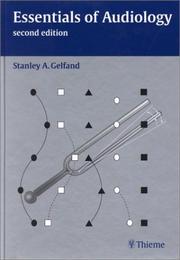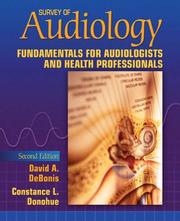| Listing 1 - 10 of 445 | << page >> |
Sort by
|
Book
Year: 2022 Publisher: Cape Town : AOSIS,
Abstract | Keywords | Export | Availability | Bookmark
 Loading...
Loading...Choose an application
- Reference Manager
- EndNote
- RefWorks (Direct export to RefWorks)
The success of any preventive healthcare programme is reliant on a functional healthcare system. Within this system of care, healthcare professionals, including audiologists, can only practice safely and effectively if they possess an appreciation of the complexities and challenges that exist in that context. Where healthcare professionals have such awareness that aids them to recognise opportunities for errors that can cause patients harm and where they take steps to prevent these mistakes is where preventive audiology is positioned. This edited book, Complexities and Challenges in Preventive Audiology: An African Perspective, is a sequel to another book by the current editor titled Preventive Audiology: An African Perspective. While in the process of editing that book, the editor identified that a lacuna of contextually relevant collation of evidence on complexities and challenges faced by the field of audiology within the African context in implementing preventive audiology existed. The goal of this book is to delve into these complexities and challenges for various key areas in audiology. All chapters deliberate on evidence-based perspectives grounded in the African context, with deliberate and preferential reliance on contemporary locally relevant evidence that allows for accurate reflection of current complexities and challenges in ear and hearing care delivery within the African context. Contributors were encouraged to be as comprehensive as possible in their review of the literature within the African context, where available. Complexities brought about by context, such as cultural and linguistic diversity as well as traditional and alternative healthcare, on preventive audiology within the South African context, are also covered in this book. As each chapter explores prevailing complexities and challenges, potential solutions and recommendations for all challenges identified are also offered, having carefully and deliberately engaged with local evidence, local context, and local policies and regulations to ensure an Afrocentric contribution to the world of evidence. All chapters in the book have a goal of ensuring that increased efforts are directed towards the provision of clinical services that are driven through best practice by contextually relevant and responsive evidence.

ISBN: 0683006207 Year: 1995 Publisher: Baltimore Williams and Wilkins
Abstract | Keywords | Export | Availability | Bookmark
 Loading...
Loading...Choose an application
- Reference Manager
- EndNote
- RefWorks (Direct export to RefWorks)

ISBN: 1588900177 Year: 2001 Publisher: New York Thieme
Abstract | Keywords | Export | Availability | Bookmark
 Loading...
Loading...Choose an application
- Reference Manager
- EndNote
- RefWorks (Direct export to RefWorks)
Book
ISBN: 1635501377 9781635501377 9781635501438 1635501431 Year: 2021 Publisher: San Diego, CA
Abstract | Keywords | Export | Availability | Bookmark
 Loading...
Loading...Choose an application
- Reference Manager
- EndNote
- RefWorks (Direct export to RefWorks)
"Adult Audiologic Rehabilitation, Third Edition is an advanced textbook for doctoral level audiology students that focuses solely on adults with a completely international perspective. It is the only advanced text to meet the need for the high level of preparation required for doctoral level training. It is also an essential resource for practicing clinicians looking for a complete reference on the latest techniques and technologies. With ever changing technology and new methodologies in client care, the third edition of Adult Audiologic Rehabilitation is a critical resource to audiology education. The book covers definitions of audiologic rehabilitation, an overview of the area, psychosocial impact of hearing loss, assessment strategies, current technologies, treatment methodologies, e-technologies, research needs, and special issues in audiologic rehabilitation. It has been deliberately structured to move the reader from introduction, to specific details of the specialty of audiologic rehabilitation, to providing insights into characteristics of this patient population, and thence to a framework for assessment and treatment of the impact of hearing loss"--
Book
ISBN: 1536177032 Year: 2020 Publisher: New York : Nova Science Publishers,
Abstract | Keywords | Export | Availability | Bookmark
 Loading...
Loading...Choose an application
- Reference Manager
- EndNote
- RefWorks (Direct export to RefWorks)
"This 4 volume set presents important research on audiology and hearing. Some of the topics discussed herein include: · cochlear implantation · chronic tinnitus · the auditory brainstem response · sensorineural hearing loss · autoimmune inner ear disease · presbyastasis"--
Book
Year: 2022 Publisher: Cape Town : AOSIS,
Abstract | Keywords | Export | Availability | Bookmark
 Loading...
Loading...Choose an application
- Reference Manager
- EndNote
- RefWorks (Direct export to RefWorks)
The success of any preventive healthcare programme is reliant on a functional healthcare system. Within this system of care, healthcare professionals, including audiologists, can only practice safely and effectively if they possess an appreciation of the complexities and challenges that exist in that context. Where healthcare professionals have such awareness that aids them to recognise opportunities for errors that can cause patients harm and where they take steps to prevent these mistakes is where preventive audiology is positioned. This edited book, Complexities and Challenges in Preventive Audiology: An African Perspective, is a sequel to another book by the current editor titled Preventive Audiology: An African Perspective. While in the process of editing that book, the editor identified that a lacuna of contextually relevant collation of evidence on complexities and challenges faced by the field of audiology within the African context in implementing preventive audiology existed. The goal of this book is to delve into these complexities and challenges for various key areas in audiology. All chapters deliberate on evidence-based perspectives grounded in the African context, with deliberate and preferential reliance on contemporary locally relevant evidence that allows for accurate reflection of current complexities and challenges in ear and hearing care delivery within the African context. Contributors were encouraged to be as comprehensive as possible in their review of the literature within the African context, where available. Complexities brought about by context, such as cultural and linguistic diversity as well as traditional and alternative healthcare, on preventive audiology within the South African context, are also covered in this book. As each chapter explores prevailing complexities and challenges, potential solutions and recommendations for all challenges identified are also offered, having carefully and deliberately engaged with local evidence, local context, and local policies and regulations to ensure an Afrocentric contribution to the world of evidence. All chapters in the book have a goal of ensuring that increased efforts are directed towards the provision of clinical services that are driven through best practice by contextually relevant and responsive evidence.

ISBN: 0205531954 9780205531950 Year: 2008 Publisher: Boston Pearson
Abstract | Keywords | Export | Availability | Bookmark
 Loading...
Loading...Choose an application
- Reference Manager
- EndNote
- RefWorks (Direct export to RefWorks)
Book
Year: 2022 Publisher: Cape Town, South Africa : AOSIS,
Abstract | Keywords | Export | Availability | Bookmark
 Loading...
Loading...Choose an application
- Reference Manager
- EndNote
- RefWorks (Direct export to RefWorks)
This book is an original scholarly book that introduces the concept of preventive audiology, with a specific focus on the African context, which is in line with the South African re-engineered primary healthcare strategy as well as the World Health Organisation's approach. The book reflects on contextually relevant and responsive evidence-based perspectives, grounded in an African context on preventive audiology, in four major ear and hearing burdens of disease within the South African context: (1) early hearing detection and intervention, (2) middle ear pathologies, (3) ototoxicity, and (4) noise-induced hearing loss. The book represents innovative research, seen from both a South African and global perspective. It offers new discourse and argues for a paradigm shift in how audiology is theorised and performed, particularly in low-and-middle-income country contexts. The goal of this book is to motivate a paradigm shift in how the ear and hearing care is approached within this low-and-middle-income country context while arguing for Afrocentric best practice evidence that leads to next practice.
Book
Year: 2022 Publisher: Cape Town, South Africa : AOSIS,
Abstract | Keywords | Export | Availability | Bookmark
 Loading...
Loading...Choose an application
- Reference Manager
- EndNote
- RefWorks (Direct export to RefWorks)
This book is an original scholarly book that introduces the concept of preventive audiology, with a specific focus on the African context, which is in line with the South African re-engineered primary healthcare strategy as well as the World Health Organisation's approach. The book reflects on contextually relevant and responsive evidence-based perspectives, grounded in an African context on preventive audiology, in four major ear and hearing burdens of disease within the South African context: (1) early hearing detection and intervention, (2) middle ear pathologies, (3) ototoxicity, and (4) noise-induced hearing loss. The book represents innovative research, seen from both a South African and global perspective. It offers new discourse and argues for a paradigm shift in how audiology is theorised and performed, particularly in low-and-middle-income country contexts. The goal of this book is to motivate a paradigm shift in how the ear and hearing care is approached within this low-and-middle-income country context while arguing for Afrocentric best practice evidence that leads to next practice.
Book
Year: 2022 Publisher: Cape Town, South Africa : AOSIS,
Abstract | Keywords | Export | Availability | Bookmark
 Loading...
Loading...Choose an application
- Reference Manager
- EndNote
- RefWorks (Direct export to RefWorks)
This book is an original scholarly book that introduces the concept of preventive audiology, with a specific focus on the African context, which is in line with the South African re-engineered primary healthcare strategy as well as the World Health Organisation's approach. The book reflects on contextually relevant and responsive evidence-based perspectives, grounded in an African context on preventive audiology, in four major ear and hearing burdens of disease within the South African context: (1) early hearing detection and intervention, (2) middle ear pathologies, (3) ototoxicity, and (4) noise-induced hearing loss. The book represents innovative research, seen from both a South African and global perspective. It offers new discourse and argues for a paradigm shift in how audiology is theorised and performed, particularly in low-and-middle-income country contexts. The goal of this book is to motivate a paradigm shift in how the ear and hearing care is approached within this low-and-middle-income country context while arguing for Afrocentric best practice evidence that leads to next practice.
| Listing 1 - 10 of 445 | << page >> |
Sort by
|

 Search
Search Feedback
Feedback About UniCat
About UniCat  Help
Help News
News